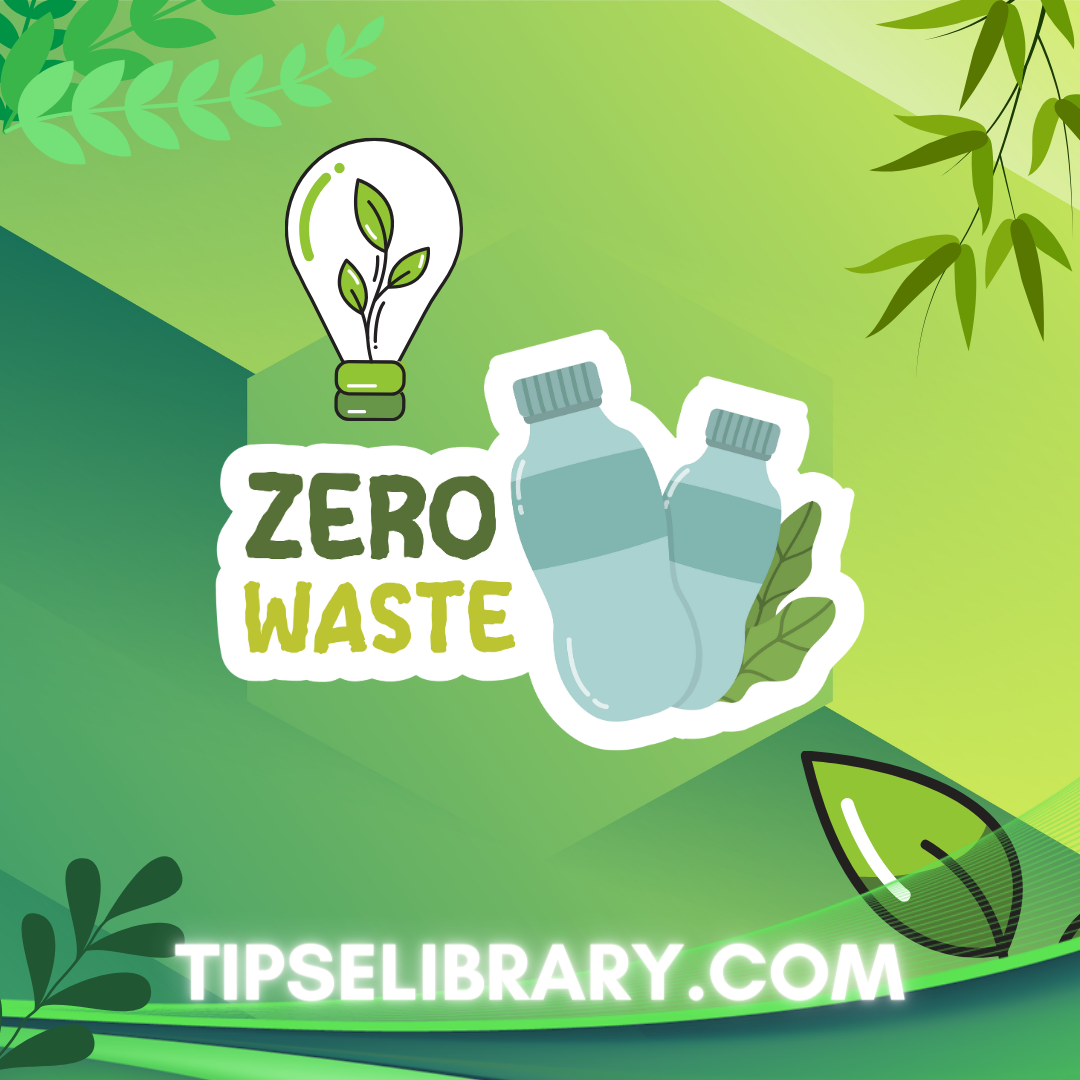Mastering Zero Waste: A Comprehensive Guide to Transforming Your Home Into an Eco-Friendly Haven
Understanding Zero Waste: What is it and why is it important?
In a world where waste production is at an all-time high, adopting a zero waste lifestyle has become more crucial than ever. But what exactly does zero waste mean? Simply put, zero waste is a philosophy that aims to minimize waste generation by rethinking consumption patterns and implementing sustainable practices. It involves reducing, reusing, recycling, and composting to divert waste from landfills and create a more sustainable future.
The importance of zero waste cannot be overstated. Our planet is facing environmental challenges such as climate change, pollution, and resource depletion. By embracing a zero waste lifestyle, you can make a significant impact on reducing your carbon footprint and preserving natural resources. Every small action counts, from using reusable bags and bottles to composting kitchen scraps. By understanding the principles of zero waste and implementing them in your daily life, you can contribute to a healthier and more sustainable planet for future generations.

The Benefits of Adopting a Zero Waste Lifestyle
Adopting a zero waste lifestyle offers a multitude of benefits for both individuals and the environment. By reducing waste production, you can save money, conserve resources, and improve the overall quality of your life. Let’s explore some of the key benefits of embracing zero waste.
Firstly, going zero waste can lead to significant cost savings. By reducing consumption and reusing items, you can cut down on unnecessary expenses and make more conscious purchasing decisions. Additionally, many zero waste practices, such as composting and recycling, can help lower waste disposal costs.
Secondly, embracing zero waste helps conserve valuable resources. The production and disposal of consumer goods require vast amounts of energy, water, and raw materials. By minimizing waste generation, you can decrease the demand for these resources and minimize environmental degradation.
Lastly, adopting a zero waste lifestyle promotes a healthier and cleaner living environment. By reducing waste, you can prevent pollution, improve air and water quality, and create a safer space for yourself and your community. Additionally, by using natural and eco-friendly alternatives, you can minimize exposure to harmful chemicals found in conventional products.
Zero Waste Statistics: The Environmental Impact of Waste
To truly understand the urgency of adopting a zero waste lifestyle, it’s essential to delve into the staggering statistics surrounding waste production and its environmental impact.
Did you know that in the United States alone, over 292 million tons of waste were generated in 2018? This translates to roughly 4.9 pounds of waste per person per day. Unfortunately, only about 32% of this waste was recycled or composted, and the rest ended up in landfills or incinerators.
The environmental consequences of this waste production are profound. Landfills emit greenhouse gases such as methane, which contribute to climate change. Incineration releases toxic pollutants into the air, posing health risks to nearby communities. Moreover, the extraction and processing of raw materials for consumer goods lead to habitat destruction, deforestation, and water pollution.
By understanding these statistics, we can see the urgent need for change. Adopting a zero waste lifestyle is not only beneficial for individuals but also crucial for safeguarding our planet’s future.
Getting Started: Assessing Your Current Waste Habits
To embark on your zero waste journey, it’s essential to assess your current waste habits and identify areas for improvement. Here are some steps to get you started:
- Conduct a waste audit: Take a close look at the waste you produce over a week or month. Identify the types of waste, such as food scraps, packaging, or plastic bottles. This will help you understand your consumption patterns and target the areas where you can make the most significant impact.
- Set goals: Based on your waste audit, set specific goals for waste reduction. For example, aim to reduce food waste by 50% or eliminate single-use plastics from your daily routine. Setting measurable goals will help you stay motivated and track your progress.
- Educate yourself: Research and educate yourself about zero waste practices and sustainable alternatives. Familiarize yourself with composting techniques, recycling guidelines, and eco-friendly products. The more knowledge you have, the better equipped you’ll be to make informed decisions.
Remember, transitioning to a zero waste lifestyle is a journey, and it’s okay to start small. Every step you take towards reducing waste counts, so be patient with yourself and celebrate your achievements along the way.
Decluttering and Minimizing: How to Simplify Your Life and Reduce Waste
One of the fundamental principles of zero waste living is decluttering and minimizing possessions. By simplifying your life, you not only reduce waste but also create a more peaceful and intentional living space. Here are some tips to help you declutter and minimize:
- Assess your belongings: Take stock of all your possessions and evaluate their usefulness and significance in your life. Ask yourself, “Do I really need this?” and “Does it bring me joy?” Be honest with yourself and let go of items that no longer serve a purpose.
- Practice the three Rs: Adopt the principles of reduce, reuse, and recycle. Reduce your consumption by being more mindful of your purchases. Reuse items whenever possible, such as repurposing glass jars for storage or using old t-shirts as cleaning rags. Finally, recycle items that cannot be reused to ensure they don’t end up in landfills.
- Adopt a minimalist mindset: Embrace minimalism by focusing on quality over quantity. Invest in well-made, durable items that will last longer and serve multiple purposes. Avoid impulse buying and instead, only bring items into your home that align with your values and needs.
Decluttering and minimizing not only reduce waste but also bring a sense of calm and clarity to your life. By letting go of excess possessions, you create space for what truly matters and pave the way for a more sustainable future.
Sustainable Shopping: Tips for Conscious Consumerism
In a world driven by consumerism, making sustainable choices while shopping is key to embracing a zero waste lifestyle. Here are some tips to help you become a conscious consumer:
- Shop mindfully: Before making a purchase, ask yourself if you truly need the item and if it aligns with your values. Avoid impulse buying and give yourself time to research and consider alternatives.
- Buy second-hand: Embrace the beauty of pre-loved items by shopping at thrift stores, consignment shops, or online platforms dedicated to second-hand goods. Not only will you save money, but you’ll also contribute to reducing waste by giving items a new life.
- Choose quality over quantity: Invest in well-made, durable products that will stand the test of time. Quality items may have a higher upfront cost, but they will save you money in the long run by not needing frequent replacements.
- Support sustainable brands: Seek out brands that prioritize sustainability and ethical practices.
By adopting conscious consumerism, you can reduce waste, support ethical practices, and send a message to businesses that sustainability matters.
DIY and Upcycling: Repurposing Items to Reduce Waste
One of the most creative and fulfilling aspects of a zero waste lifestyle is the ability to repurpose and upcycle items. By giving new life to old or discarded objects, you can reduce waste and unleash your creativity. Here are some ideas for DIY and upcycling projects:
- Repurpose glass jars: Glass jars can be transformed into stylish storage containers for pantry staples, homemade beauty products, or even as vases for fresh flowers. Clean the jars thoroughly, remove any labels, and decorate them to suit your aesthetic.
- Turn old t-shirts into reusable bags: Cut up old t-shirts and sew them into simple tote bags. These bags can be used for grocery shopping, carrying books, or as a replacement for single-use plastic bags.
- Create a compost bin from a plastic container: Convert a large plastic container into a compost bin for food scraps. Drill holes in the lid and sides for ventilation, and place it in a convenient spot in your kitchen or backyard.
- Transform wooden pallets into furniture: With a little creativity, wooden pallets can be repurposed into unique and functional furniture pieces. From coffee tables to bookshelves, the possibilities are endless.
By embracing the art of upcycling, you not only reduce waste but also add a personal touch to your home and contribute to a more sustainable future.
Composting and Recycling: Proper Waste Disposal Techniques
Proper waste disposal is a crucial aspect of a zero waste lifestyle. By composting and recycling, you can divert waste from landfills and contribute to the creation of valuable resources. Here’s how you can incorporate composting and recycling into your routine:
- Composting: Composting is the process of breaking down organic materials, such as food scraps and yard waste, into nutrient-rich soil. Start by setting up a compost bin in your backyard or use a countertop composting system for indoor composting. Remember to balance the compost with a mix of brown (dry) and green (wet) materials and turn it regularly to encourage decomposition.
- Recycling: Recycling is the process of converting waste materials into reusable materials. Familiarize yourself with your local recycling guidelines to ensure you’re recycling correctly. Separate recyclables such as paper, cardboard, glass, plastic, and metal, and place them in designated recycling bins. Avoid contamination by rinsing containers and removing any non-recyclable components.
- Reducing waste: While composting and recycling are essential, the ultimate goal is to reduce waste at its source. Be mindful of your consumption and make conscious choices to minimize packaging waste. Choose products with minimal or recyclable packaging, opt for bulk purchases to reduce packaging waste, and use reusable alternatives whenever possible.
By implementing proper waste disposal techniques, you can significantly reduce your environmental impact and contribute to a more sustainable future.
Zero Waste in the Kitchen: Tips for Sustainable Cooking and Food Storage
The kitchen is often a hotspot for waste generation, but with a few simple changes, you can transform it into a zero waste haven. Here are some tips for sustainable cooking and food storage:
- Plan meals and reduce food waste: Plan your meals in advance to avoid overbuying and wasting food. Make a grocery list based on the meals you plan to cook, and stick to it while shopping. Store leftovers properly and get creative with repurposing them into new dishes.
- Buy in bulk: Purchase pantry staples such as grains, nuts, and spices in bulk to minimize packaging waste. Bring your own reusable containers to bulk stores or utilize the bulk bins at your local grocery store.
- Use reusable alternatives: Replace single-use items with reusable alternatives. Swap disposable paper towels for reusable cloth towels, use washable silicone baking mats instead of parchment paper, and opt for stainless steel or glass containers for food storage.
- Compost food scraps: Set up a composting system in your kitchen or backyard to divert food scraps from the landfill. Utilize a countertop compost bin for convenience and transfer the contents to an outdoor compost pile or bin regularly.
By adopting these practices in the kitchen, you can significantly reduce waste and create a more sustainable and efficient cooking environment.
Zero Waste Personal Care: Eco-Friendly Alternatives for Beauty and Hygiene Products
Personal care products often come in excessive packaging and contain harmful chemicals that can harm both your health and the environment. By switching to eco-friendly alternatives, you can minimize waste and prioritize your well-being. Here are some ideas for zero waste personal care:
- Make your own beauty products: Many beauty and hygiene products can be easily made at home using natural ingredients. Experiment with DIY recipes for items such as facial cleansers, body scrubs, and toothpaste. Not only will you reduce waste, but you’ll also have full control over the ingredients you use.
- Choose package-free options: Look for package-free alternatives for personal care products. Solid shampoo and conditioner bars, soap bars, and toothpaste tablets are excellent options that eliminate the need for plastic bottles.
- Invest in reusable alternatives: Replace single-use items with reusable alternatives. Swap disposable cotton pads with washable cloth pads or reusable silicone makeup remover pads. Invest in a safety razor or a menstrual cup instead of disposable razors or tampons.
- Support sustainable brands: Seek out ethical and sustainable brands that prioritize minimal packaging and use natural and eco-friendly ingredients. Research the ingredients used in your personal care products and choose those that align with your values.
By making conscious choices when it comes to personal care, you can reduce waste and promote a healthier and more sustainable lifestyle.
Zero Waste Cleaning: Green Cleaning Methods and DIY Cleaning Products
Cleaning our homes is a necessary task, but it often involves using harsh chemicals that are harmful to both our health and the environment. By adopting green cleaning methods and making your own cleaning products, you can keep your living space clean and free from harmful toxins. Here’s how:
- Use natural cleaning ingredients: Many common household items can be used for cleaning, such as vinegar, baking soda, and lemon juice. These natural ingredients are effective at removing dirt and grime without the need for harsh chemicals.
- Make your own cleaning products: DIY cleaning products are simple to make, cost-effective, and free from harmful chemicals. Create your own all-purpose cleaner by mixing equal parts water and vinegar, or make a natural scrub using baking soda and essential oils.
- Choose eco-friendly cleaning tools: Opt for reusable and eco-friendly cleaning tools. Instead of disposable paper towels, use washable microfiber cloths or old t-shirts. Replace plastic scrub brushes with wooden or bamboo alternatives.
- Support eco-friendly cleaning brands: If making your own cleaning products isn’t feasible, support brands that prioritize eco-friendly and non-toxic cleaning solutions.
By adopting green cleaning methods, you can create a clean and healthy living space while reducing waste and minimizing exposure to harmful chemicals.
Zero Waste on the Go: Sustainable Practices for Travel and Everyday Life
Living a zero waste lifestyle extends beyond the boundaries of our homes. It encompasses our everyday activities and travels. By adopting sustainable practices on the go, we can significantly reduce waste and have a positive impact on the environment.
Here are some tips for zero waste on the go:
- Bring Your Own Reusable Items: Carry a reusable water bottle, coffee cup, and utensils with you. This reduces the need for single-use items and helps you stay hydrated and nourished throughout the day.
- Pack a Zero Waste Kit: Put together a small kit that includes essentials such as a cloth napkin, reusable straw, and reusable shopping bag. Keep it in your bag or car so you’re always prepared.
- Choose Public Transportation: Whenever possible, opt for public transportation or carpooling to reduce carbon emissions. If you need to drive, consider car-sharing services or using an electric vehicle.
- Support Zero Waste Businesses: Seek out businesses that prioritize sustainability and zero waste practices. This includes cafes that offer discounts for bringing your own cup or stores that provide bulk options for groceries.
- Avoid Single-Use Plastics: Say no to single-use plastics such as straws, plastic bags, and takeout containers. Bring your own containers for leftovers and choose businesses that use compostable or recyclable packaging.
By incorporating these practices into your everyday life and travels, you can become a responsible global citizen and inspire others to follow suit.
Conclusion: The Impact of Individual Actions
While individual actions may seem small, collectively they can lead to significant environmental impacts. Embracing a zero waste lifestyle not only improves your health and well-being but also contributes to a sustainable future for the planet.
Ready to start your zero waste journey? Subscribe to our newsletter for more tips, tricks, and insights on living sustainably. Together, we can make a difference, one step at a time. Sign up now and help pave the way to a cleaner, greener world.
More from Tipelibrary
Understanding VPNs: Essential for Online Privacy and Security
- March 14, 2024
- 11 Minutes
Windows 11 24H2 Update : The AI Revolution Starts Here?
- October 5, 2024
- 6 Minutes








